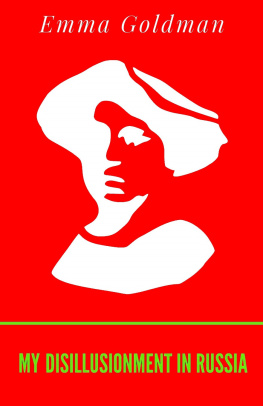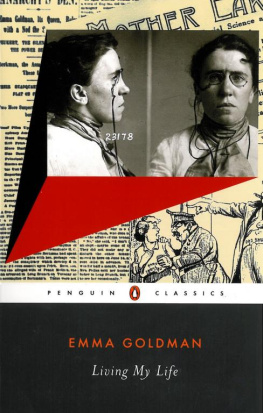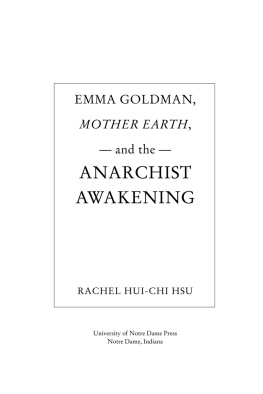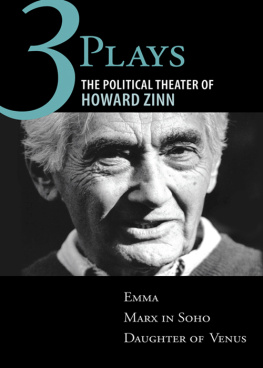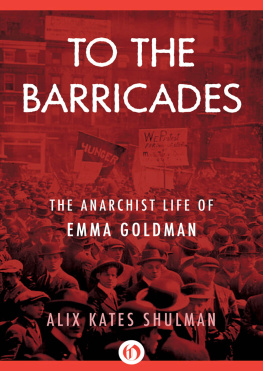Emma Goldman - Anarchism and Other Essays
Here you can read online Emma Goldman - Anarchism and Other Essays full text of the book (entire story) in english for free. Download pdf and epub, get meaning, cover and reviews about this ebook. year: 1911, publisher: Mother Earth Publishing Association, genre: Art. Description of the work, (preface) as well as reviews are available. Best literature library LitArk.com created for fans of good reading and offers a wide selection of genres:
Romance novel
Science fiction
Adventure
Detective
Science
History
Home and family
Prose
Art
Politics
Computer
Non-fiction
Religion
Business
Children
Humor
Choose a favorite category and find really read worthwhile books. Enjoy immersion in the world of imagination, feel the emotions of the characters or learn something new for yourself, make an fascinating discovery.

- Book:Anarchism and Other Essays
- Author:
- Publisher:Mother Earth Publishing Association
- Genre:
- Year:1911
- Rating:4 / 5
- Favourites:Add to favourites
- Your mark:
- 80
- 1
- 2
- 3
- 4
- 5
Anarchism and Other Essays: summary, description and annotation
We offer to read an annotation, description, summary or preface (depends on what the author of the book "Anarchism and Other Essays" wrote himself). If you haven't found the necessary information about the book — write in the comments, we will try to find it.
Anarchism and Other Essays — read online for free the complete book (whole text) full work
Below is the text of the book, divided by pages. System saving the place of the last page read, allows you to conveniently read the book "Anarchism and Other Essays" online for free, without having to search again every time where you left off. Put a bookmark, and you can go to the page where you finished reading at any time.
Font size:
Interval:
Bookmark:
Propagandism is not, as some suppose, a trade,
because nobody will follow a trade at which you
may work with the industry of a slave and die with
the reputation of a mendicant. The motives of any
persons to pursue such a profession must be
different from those of trade, deeper than pride,
and stronger than interest.
George Jacob Holyoake
Among the men and women prominent in the public life of America there are but few whose names are mentioned as often as that of Emma Goldman. Yet the real Emma Goldman is almost quite unknown. The sensational press has surrounded her name with so much misrepresentation and slander, it would seem almost a miracle that, in spite of this web of calumny, the truth breaks through and a better appreciation of this much maligned idealist begins to manifest itself. There is but little consolation in the fact that almost every representative of a new idea has had to struggle and suffer under similar difficulties. Is it of any avail that a former president of a republic pays homage at Osawatomie to the memory of John Brown? Or that the president of another republic participates in the unveiling of a statue in honor of Pierre Proudhon, and holds up his life to the French nation as a model worthy of enthusiastic emulation? Of what avail is all this when, at the same time, the living John Browns and Proudhons are being crucified? The honor and glory of a Mary Wollstonecraft or of a Louise Michel are not enhanced by the City Fathers of London or Paris naming a street after them the living generation should be concerned with doing justice to the living Mary Wollstonecrafts and Louise Michels. Posterity assigns to men like Wendel Phillips and Lloyd Garrison the proper niche of honor in the temple of human emancipation; but it is the duty of their contemporaries to bring them due recognition and appreciation while they live.
The path of the propagandist of social justice is strewn with thorns. The powers of darkness and injustice exert all their might lest a ray of sunshine enter his cheerless life. Nay, even his comrades in the struggle indeed, too often his most intimate friends show but little understanding for the personality of the pioneer. Envy, sometimes growing to hatred, vanity and jealousy, obstruct his way and fill his heart with sadness. It requires an inflexible will and tremendous enthusiasm not to lose, under such conditions, all faith in the Cause. The representative of a revolutionizing idea stands between two fires: on the one hand, the persecution of the existing powers which hold him responsible for all acts resulting from social conditions; and, on the other, the lack of understanding on the part of his own followers who often judge all his activity from a narrow standpoint. Thus it happens that the agitator stands quite alone in the midst of the multitude surrounding him. Even his most intimate friends rarely understand how solitary and deserted he feels. That is the tragedy of the person prominent in the public eye.
The mist in which the name of Emma Goldman has so long been enveloped is gradually beginning to dissipate. Her energy in the furtherance of such an unpopular idea as Anarchism, her deep earnestness, her courage and abilities, find growing understanding and admiration.
The debt American intellectual growth owes to the revolutionary exiles has never been fully appreciated. The seed disseminated by them, though so little understood at the time, has brought a rich harvest. They have at all times held aloft the banner of liberty, thus impregnating the social vitality of the Nation. But very few have succeeded in preserving their European education and culture while at the same time assimilating themselves with American life. It is difficult for the average man to form an adequate conception what strength, energy, and perseverance are necessary to absorb the unfamiliar language, habits, and customs of a new country, without the loss of ones own personality.
Emma Goldman is one of the few who, while thoroughly preserving their individuality, have become an important factor in the social and intellectual atmosphere of America. The life she leads is rich in color, full of change and variety. She has risen to the topmost heights, and she has also tasted the bitter dregs of life.
Emma Goldman was born of Jewish parentage on the 27th day of June, 1869, in the Russian province of Kovno. Surely these parents never dreamed what unique position their child would some day occupy. Like all conservative parents they, too, were quite convinced that their daughter would marry a respectable citizen, bear him children, and round out her allotted years surrounded by a flock of grandchildren, a good, religious woman. As most parents, they had no inkling what a strange, impassioned spirit would take hold of the soul of their child, and carry it to the heights which separate generations in eternal struggle. They lived in a land and at a time when antagonism between parent and offspring was fated to find its most acute expression, irreconcilable hostility. In this tremendous struggle between fathers and sons and especially between parents and daughters there was no compromise, no weak yielding, no truce. The spirit of liberty, of progress an idealism which knew no considerations and recognized no obstacles drove the young generation out of the parental house and away from the hearth of the home. Just as this same spirit once drove out the revolutionary breeder of discontent, Jesus, and alienated him from his native traditions.
What rle the Jewish race notwithstanding all anti-Semitic calumnies the race of transcendental idealism played in the struggle of the Old and the New will probably never be appreciated with complete impartiality and clarity. Only now we are beginning to perceive the tremendous debt we owe to Jewish idealists in the realm of science, art, and literature. But very little is still known of the important part the sons and daughters of Israel have played in the revolutionary movement and, especially, in that of modern times.
The first years of her childhood Emma Goldman passed in a small, idyllic place in the German-Russian province of Kurland, where her father had charge of the government stage. At that time Kurland was thoroughly German; even the Russian bureaucracy of that Baltic province was recruited mostly from German Junker. German fairy tales and stories, rich in the miraculous deeds of the heroic knights of Kurland, wove their spell over the youthful mind. But the beautiful idyl was of short duration. Soon the soul of the growing child was overcast by the dark shadows of life. Already in her tenderest youth the seeds of rebellion and unrelenting hatred of oppression were to be planted in the heart of Emma Goldman. Early she learned to know the beauty of the State: she saw her father harassed by the Christian chinovniks and doubly persecuted as petty official and hated Jew. The brutality of forced conscription ever stood before her eyes: she beheld the young men, often the sole support of a large family, brutally dragged to the barracks to lead the miserable life of a soldier. She heard the weeping of the poor peasant women, and witnessed the shameful scenes of official venality which relieved the rich from military service at the expense of the poor. She was outraged by the terrible treatment to which the female servants were subjected: maltreated and exploited by theirbarinyas, they fell to the tender mercies of the regimental officers, who regarded them as their natural sexual prey. These girls, made pregnant by respectable gentlemen and driven out by their mistresses, often found refuge in the Goldman home. And the little girl, her heart palpitating with sympathy, would abstract coins from the parental drawer to clandestinely press the money into the hands of the unfortunate women. Thus Emma Goldmans most striking characteristic, her sympathy with the underdog, already became manifest in these early years.
Font size:
Interval:
Bookmark:
Similar books «Anarchism and Other Essays»
Look at similar books to Anarchism and Other Essays. We have selected literature similar in name and meaning in the hope of providing readers with more options to find new, interesting, not yet read works.
Discussion, reviews of the book Anarchism and Other Essays and just readers' own opinions. Leave your comments, write what you think about the work, its meaning or the main characters. Specify what exactly you liked and what you didn't like, and why you think so.

